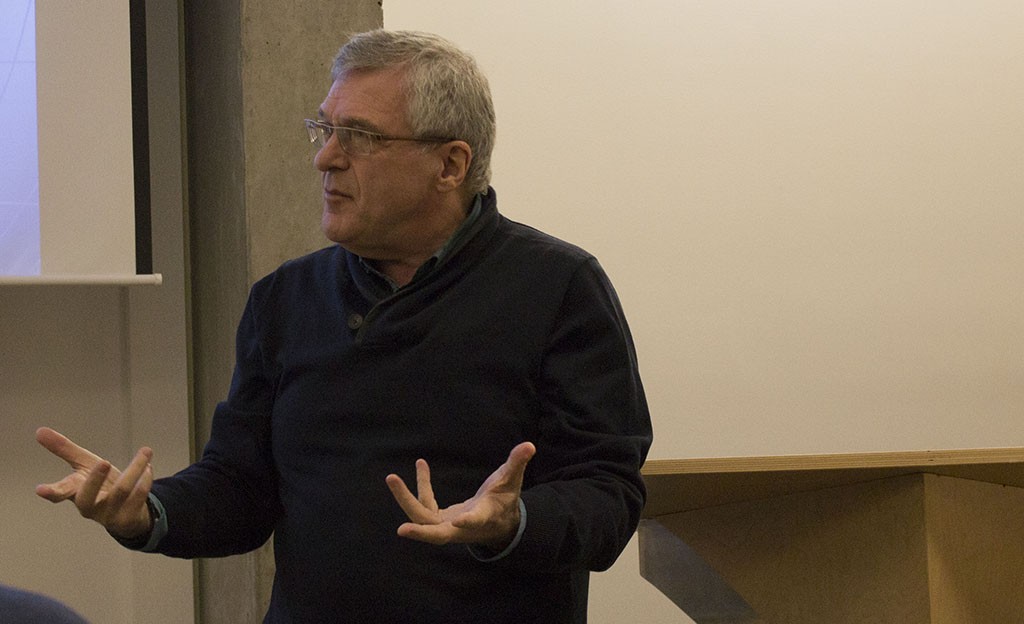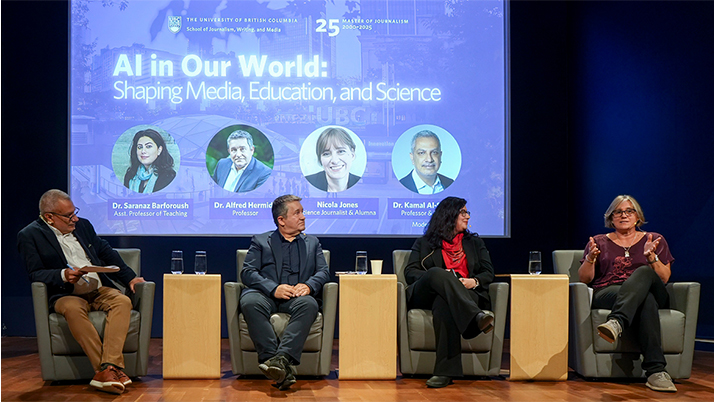

Leading media ethicist Stephen Ward shared his insights with students during a visit in February to UBC Journalism, where he is Distinguished Lecturer of Ethics.
His stay included in-class lectures, one-on-one student mentorship and interviews with CBC’s “On the Coast,” where he discussed ISIS and the media, and CKNW’s “The John McComb Show,” where he commented on ethics at the CBC.
Ward is a former director of the UBC j-school. His newest book, “Radical Media Ethics,” will be available this May.
UBC Journalism sat down with Dr. Ward to discuss his role at the j-school and the future of media ethics.
Stephen, you’ve just been given the title Distinguished Lecturer of Ethics. What does this mean for you and for the UBC Graduate School of Journalism?
It’s an honorary title in recognition of my service to the school and my career in ethics. What it does is solidify my relationship with the school.
I am hopeful that this is a first step towards my helping with ethics at the school even more. I see it as forward-looking: What can I do for the school and the students in the future? I really think it is wonderful that the school would want to recognize me this way.
You’ve had a long career as a journalist and now you’ve become a go-to name in media ethics. Can you tell us about that shift in your career?
Journalism came about as something I thought I’d like to do that might get me a job. But I was always an academic and a philosopher at heart. I wanted to slow down and write more thoughtfully. I saw a chance in the field where writing and theory could go together. And ethics was obvious because when you’re out in the field the ethical issues are what can trouble you.
Much of the ethics discussions were today’s hot issue and tomorrow’s hot issue. There was no reflection on the basis of those views. And you kept seeing the same old arguments coming back. The same old misunderstanding kept coming back.
So my job became to critique these views. So part of my job was to be the skeptic.
The one thing I would say is that students often want to see their careers as fixed. Like, “I’ve got to have a goal.” And secondly, they define the goal very narrowly. And I think life rarely goes that way. That doesn’t mean you shouldn’t have goals. But I think [students] should think more broadly about getting the skills they need, the knowledge they need. And then those skills will come in to play as they go along and come in to areas that they never thought would be open to them. Like with myself, I never thought a PhD in philosophy would be so helpful.
During your in-class lectures you addressed a couple questions. I would like to pose one of them to you again. What is journalism? Or what could it be?
At it’s finest it will be an interpretative, cross-border discourse about culture and cultural traditions. It will be about our global world and the varying perspectives that different cultures bring to it.
The journalist’s role will be to try to make sense of those different views. That’s why I am interested in global ethics. Our role as journalists who encourage dialogue is going to be so important.
What are the ethical challenges moving forward?
There are all kinds of challenges moving forward. The problem will be to propose practices and principles that everyone can agree on. That is, we have principles that cross platforms and cross borders. All the activity of journalism ethics today is not about telling you what the rules are – it’s constructing the rules that should be.
I have not the slightest hope that everyone out there with a laptop – and does what they think is journalism – is going to agree to what is proposed. There will always be cowboys. But there is a substantial core of responsible citizens and bloggers, journalists and professionals who all have an agreement that we can reach – while allowing for variations.
You can read more about Stephen Ward and media ethics on his website Media Morals.


